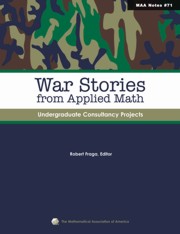Book contents
- Frontmatter
- Contents
- Introduction
- An Industrial Mathematics Program
- Source of Problems: Industrial Contacts
- Panel Discussion Following “Industrial Contacts”
- Course Integration
- The Consortium for Mathematics and Its Applications (COMAP)
- Program Management
- Project Deliverables I
- Project Deliverables II
- Using Projects from Industry to Teach Mathematics and Statistics to Liberal Arts Majors
- Mathematical Modeling in ICIC Projects
- Appendix: A Sample HMC Report
An Industrial Mathematics Program
- Frontmatter
- Contents
- Introduction
- An Industrial Mathematics Program
- Source of Problems: Industrial Contacts
- Panel Discussion Following “Industrial Contacts”
- Course Integration
- The Consortium for Mathematics and Its Applications (COMAP)
- Program Management
- Project Deliverables I
- Project Deliverables II
- Using Projects from Industry to Teach Mathematics and Statistics to Liberal Arts Majors
- Mathematical Modeling in ICIC Projects
- Appendix: A Sample HMC Report
Summary
Introduction
Our program at Marquette is a small do-it-yourself operation, but you might still get some useful ideas from it. This chapter tells the story of what seems to work for us, with all its warts and struggles. I offer these observations not as an authority but as one who has had some experiences others might use.
Industrial Mathematics in the Marquette University Department of Mathematics, Statistics and Computer Science (MSCS) has the following components:
Faculty orientation and perspective
Influence of biological mathematics
Course projects
Course offerings
Work experience
Industrial-based graduate research assistants
Career counselling
Consulting and research
It is a high faculty involvement, low University and industry cost program that produces well-educated, marketable mathematicians at both the graduate and the undergraduate levels. By “high faculty involvement” I mean that the faculty devotes significant effort to it.
This chapter reports on a program in industrial mathematics that has evolved over a period of more than 20 years and has involved many people. Much of the leadership and cultivation of the climate has come from our Department Chair, Doug Harris. Other faculty who regularly teach in the mode described here include Steve Merrill, Gary Krenz, Peter Tonellato, Anne Clough, Naveen Bansal, and myself, George Corliss.
What IS industrial mathematics?
“Whatever we define it to be, nothing more, and nothing less.” — after Lewis Carroll.
Not: “If the only tool you have is a hammer, the whole world looks like a nail.” — Mark Twain.
Anything we do that is useful in industry — Marquette Department of Mathematics, Statistics, and Computer Science.
- Type
- Chapter
- Information
- War Stories from Applied MathUndergraduate Consultancy Projects, pp. 5 - 24Publisher: Mathematical Association of AmericaPrint publication year: 2007



